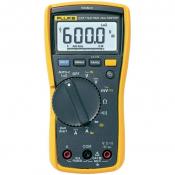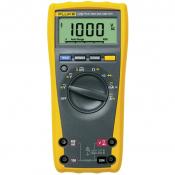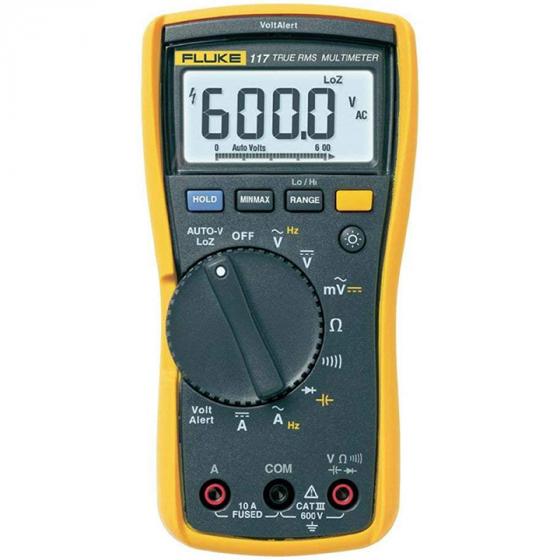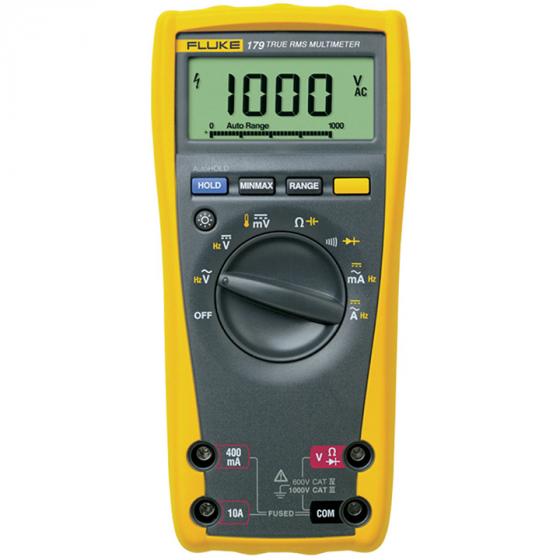Product Comparison: Fluke 117 vs Fluke 179/EDA2
This site is a free online resource that strives to offer helpful content and comparison features to its visitors. Please be advised that the operator of this site accepts advertising compensation from certain companies that appear on the site, and such compensation impacts the location and order in which the companies (and/or their products) are presented, and in some cases may also impact the scoring that is assigned to them. The scoring that appears on this site is determined by the site operator in its sole discretion, and should NOT be relied upon for accuracy purposes. In fact, Company/product listings on this page DO NOT imply endorsement by the site operator. Except as expressly set forth in our Terms of Use, all representations and warranties regarding the information presented on this page are disclaimed. The information which appears on this site is subject to change at any time. More info




- The meter feels solid and robust in the hands and not easily damaged. The non-contact voltage sensor is very sensitive, especially when set to "HI", which makes it ideal when checking for electrical wires inside of walls.
- However for 95% of the work our electro-mech techs are doing in a 18 acre production factory, this meter fits the bill, and it's smaller, lighter, cheaper, and better display than the 87.
- I used the non-contact voltage function to detect any wires behind walls before cutting into them since I could follow the wiring starting from the switch and moving backwards - something you cannot do with voltage pens.
- This meter with the non contact voltage detector has added a higher margin of safety when having to cut into a wall. Knowing that the circuit is live or dead and it's approximate location has made things niche better.
- The Fluke multimeter comparison on the website is also wrong and missing data. For example, it shows "n/a" under DC and AC current for the 117 which is incorrect. That's just one of many such errors making an already confusing situation more confusing.
- It has been a solid meter for troubleshooting and rebuilding a few amplifiers and receivers as well as building other misc. AC/DC projects from the ground up.
- This thing is extremely fast and I have to assume accurate. I use it for home electronics work -- measuring AC and DC current, voltage, continuity, and so forth. The build quality is excellent.
- The Fluke 179 is an excellent meter and I've used it for serious electronics hobby work for a couple of years now including measuring very high AC / DC voltages and currents. It's extremely accurate, reliable, and has several functions (measurements) it can do very well.
- I work on large induction power supplies, complex PLC control systems, and general industrial maintenance. This meter covers all these fields and more. I have used it for over 4 years!
- I have been using this meter for the last couple of years in troubleshooting HVAC units. It has all the desired features for measuring AC and DC voltage, current, frequency, temperature, resistance, and capacitance.
















- This meter does everything I need. If this meter doesn't do something it's reading milliamps unfortunately. But I break out my 87 for that which I usually use on my more intricate stuff anyway. The 117 is the 10-in-1 screwdriver of meters for me.
- It features AC & DC current measurement to 10A however it lacks a mA and uA range since this is an electrician's meter, not an electronics meter. Two more modes it offers are “volt alert” and a LoZ voltage measurement.
- That's not such a big deal if you're taking measurements from a clean / pure sine wave source, but if it's a distorted waveform or not a sine wave (such as a measurement on a modified sine wave AC inverter), your measurement can be off quite a bit on non-RMS meter.
- The capacitance tester is decent enough. Accuracy isn't too bad for it and its measurement range goes down to 1 nF.
- It reads accurately, measure what you need to measure, and has a user friendly layout.
- I highly recommend this model. Helps me on my day to day basis with my current job diagnosing alarm systems as well as 66 blocks. Works well for high and low voltage applications.
- The model 179 has proven to be a real workhorse in our lab for trouble shooting along with test setups. used by lab tech and engineers along with our skilled trades.
- The 179 is rugged. reliable and holds calibration better that any other competitors meters. We have tried competitors maters but have always come back to the Fluke line of equipment. In short you get what you pay for.
- Also love the very accurate ohms setting. Also use the DC amp option checking parasitic draws. And the meter is very accurate and works very well for fixing electronics at night.
- I do guitar amplifier repair, and this is the perfect meter, fast, reliable, accurate, feature-rich. Everything I need in one package.
- The large 6,000 count display makes the meter easy-to-read and understand; as long as you are looking directly at the screen. My only (minor) complaint is if the screen is looked at - even slightly - from above, the digits disappear, but for me this is only a minor inconvenience.
- Solid multimeter for everyday use by an electrician. Large display is easy to read. Easy to select functions even with gloves on using the large dial. Ready to roll right out of the package and continues to out perform day after day..
- The large selector switch knob makes it easy to use while wearing rubber gloves. The display has large white LED backlit with large digits. It is easy to read in dark locations.
- Looking for a high quality multimeter I purchased a Fluke 117 True RMS unit, not only is it high quality, but it is very easy to use, the meter is very accurate, and the unit stays where you put it, excellent design, functions, a True Multimeter.
- Large white LED backlit display/larger digits – Easier to read in dark locations. Automatic AC/DC voltage selection Prevents false reading from ghost voltage Strong magnet and protective casing of the meter
- I've had my 179 for about a month now and I will say that compared to the fieldpiece I had, this is the Cadillac of meters. So easy to use and read.
- buying 179 totally worth it. In my diagnosis I never question the reading and speed and accuracy of this meter saves a lot of time.
- I work as a systems control technician and i have to say this meter is both user friendly and very reliable. I primarily use this meter on Automation controls to trouble shoot and perform point to point inspections on hvac controls.
- This meter replaced my perfectly working 112, which now stays home for trouble shooting around the house while my 179 goes to the job and puts money in my pocket.
- I was up and using it within minutes of taking it out of the box. It has all the features I need and work, around the house, and with my hobby electronics.
Price History
Popular Comparisons


















